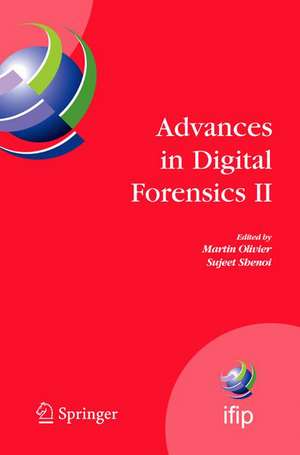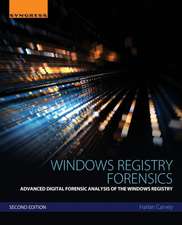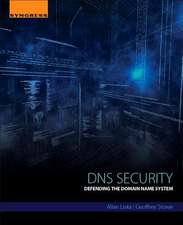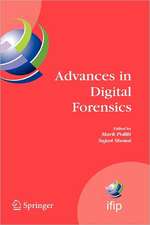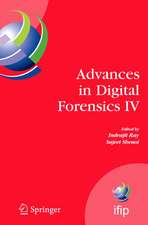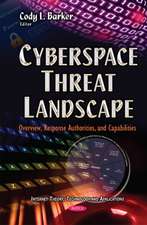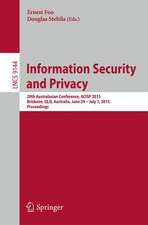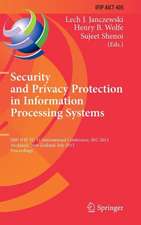Advances in Digital Forensics II: IFIP Advances in Information and Communication Technology, cartea 222
Editat de Martin S. Olivier, Sujeet Shenoien Limba Engleză Hardback – 30 aug 2006
Advances in Digital Forensics II describes original research results and innovative applications in the emerging discipline of digital forensics. In addition, it highlights some of the major technical and legal issues related to digital evidence and electronic crime investigations. The areas of coverage include:
- Themes and Issues in Digital Forensics
- Evidence Collecting and Handling
- Forensic Techniques
- Operating System and File System Forensics
- Network Forensics
- Portable Electronic Device Forensics
- Linux and File System Forensics
- Training, Governance and Legal Issues
Advances in Digital Forensicsis an important resource for researchers, faculty members and graduate students, as well as for practitioners and individuals engaged in research and development efforts for the law enforcement and intelligence communities.
Martin S. Olivier is a Professor of Computer Science and co-manager of the Information and Computer Security Architectures Research Group at the University of Pretoria, Pretoria, South Africa.
Sujeet Shenoi is the F.P. Walter Professor of Computer Science and a principal with the Center for Information Security at the University of Tulsa, Tulsa, Oklahoma, USA.
For more information about the 300 other books in the IFIP series, please visit www.springeronline.com.
For more information about IFIP, please visit www.ifip.org.
| Toate formatele și edițiile | Preț | Express |
|---|---|---|
| Paperback (1) | 649.75 lei 6-8 săpt. | |
| Springer Us – 8 dec 2010 | 649.75 lei 6-8 săpt. | |
| Hardback (1) | 658.84 lei 6-8 săpt. | |
| Springer Us – 30 aug 2006 | 658.84 lei 6-8 săpt. |
Din seria IFIP Advances in Information and Communication Technology
- 20%
 Preț: 170.51 lei
Preț: 170.51 lei - 20%
 Preț: 615.74 lei
Preț: 615.74 lei - 20%
 Preț: 340.32 lei
Preț: 340.32 lei -
 Preț: 397.38 lei
Preț: 397.38 lei - 20%
 Preț: 336.02 lei
Preț: 336.02 lei - 20%
 Preț: 340.98 lei
Preț: 340.98 lei - 20%
 Preț: 503.41 lei
Preț: 503.41 lei - 17%
 Preț: 523.40 lei
Preț: 523.40 lei - 20%
 Preț: 502.06 lei
Preț: 502.06 lei - 17%
 Preț: 488.96 lei
Preț: 488.96 lei - 20%
 Preț: 501.04 lei
Preț: 501.04 lei - 20%
 Preț: 403.20 lei
Preț: 403.20 lei - 20%
 Preț: 2194.47 lei
Preț: 2194.47 lei - 15%
 Preț: 708.83 lei
Preț: 708.83 lei - 20%
 Preț: 1162.12 lei
Preț: 1162.12 lei - 20%
 Preț: 1288.25 lei
Preț: 1288.25 lei - 18%
 Preț: 1227.21 lei
Preț: 1227.21 lei - 20%
 Preț: 1282.00 lei
Preț: 1282.00 lei - 18%
 Preț: 1224.18 lei
Preț: 1224.18 lei - 18%
 Preț: 953.03 lei
Preț: 953.03 lei - 18%
 Preț: 953.20 lei
Preț: 953.20 lei - 18%
 Preț: 944.99 lei
Preț: 944.99 lei - 18%
 Preț: 948.29 lei
Preț: 948.29 lei - 15%
 Preț: 645.47 lei
Preț: 645.47 lei - 18%
 Preț: 960.13 lei
Preț: 960.13 lei - 20%
 Preț: 1288.11 lei
Preț: 1288.11 lei - 15%
 Preț: 645.79 lei
Preț: 645.79 lei - 20%
 Preț: 1271.10 lei
Preț: 1271.10 lei - 20%
 Preț: 1922.99 lei
Preț: 1922.99 lei - 20%
 Preț: 1285.97 lei
Preț: 1285.97 lei - 18%
 Preț: 956.69 lei
Preț: 956.69 lei - 18%
 Preț: 946.72 lei
Preț: 946.72 lei - 18%
 Preț: 1224.36 lei
Preț: 1224.36 lei - 20%
 Preț: 1277.89 lei
Preț: 1277.89 lei - 18%
 Preț: 953.03 lei
Preț: 953.03 lei - 18%
 Preț: 947.98 lei
Preț: 947.98 lei - 20%
 Preț: 1292.54 lei
Preț: 1292.54 lei - 18%
 Preț: 956.18 lei
Preț: 956.18 lei - 20%
 Preț: 645.79 lei
Preț: 645.79 lei - 20%
 Preț: 1284.47 lei
Preț: 1284.47 lei - 18%
 Preț: 1235.25 lei
Preț: 1235.25 lei - 20%
 Preț: 998.70 lei
Preț: 998.70 lei - 18%
 Preț: 949.23 lei
Preț: 949.23 lei - 20%
 Preț: 1283.81 lei
Preț: 1283.81 lei - 20%
 Preț: 995.89 lei
Preț: 995.89 lei - 18%
 Preț: 1231.01 lei
Preț: 1231.01 lei - 20%
 Preț: 993.09 lei
Preț: 993.09 lei - 20%
 Preț: 1288.94 lei
Preț: 1288.94 lei - 20%
 Preț: 987.17 lei
Preț: 987.17 lei
Preț: 658.84 lei
Preț vechi: 823.56 lei
-20% Nou
Puncte Express: 988
Preț estimativ în valută:
126.07€ • 132.07$ • 104.48£
126.07€ • 132.07$ • 104.48£
Carte tipărită la comandă
Livrare economică 08-22 aprilie
Preluare comenzi: 021 569.72.76
Specificații
ISBN-13: 9780387368900
ISBN-10: 0387368906
Pagini: 364
Ilustrații: XVIII, 364 p.
Dimensiuni: 155 x 235 x 30 mm
Greutate: 0.79 kg
Ediția:2006
Editura: Springer Us
Colecția Springer
Seria IFIP Advances in Information and Communication Technology
Locul publicării:New York, NY, United States
ISBN-10: 0387368906
Pagini: 364
Ilustrații: XVIII, 364 p.
Dimensiuni: 155 x 235 x 30 mm
Greutate: 0.79 kg
Ediția:2006
Editura: Springer Us
Colecția Springer
Seria IFIP Advances in Information and Communication Technology
Locul publicării:New York, NY, United States
Public țintă
Professional/practitionerCuprins
Themes and Issues.- Some Challenges in Digital Forensics.- Evidence Collection and Handling.- Advanced Forensic Format: an Open Extensible Format for Disk Imaging.- File System Support for Digital Evidence Bags.- Remote Upload of Evidence over Mobile Ad Hoc Networks.- Applying Machine Trust Models to Forensic Investigations.- Exploring Big Haystacks.- Forensic Techniques.- Countering Hostile Forensic Techniques.- Using PLSI-U To Detect Insider Threats from Email Traffic.- Collusion Detection Using Multimedia Fingerprints.- Authorship Attribution for Electronic Documents.- Linking Individuals to Digital Information.- Use-Misuse Case Driven Analysis of Positive Train Control.- Operating System and File System Forensics.- Mac OS X Forensics.- Detecting Data Concealment Programs Using Passive File System Analysis.- Assessing Trace Evidence Left by Secure Deletion Programs.- Network Forensics.- On the Reliability of Network Eavesdropping Tools.- Active Traffic Capture for Network Forensics.- Logical Traffic Isolation Using Differentiated Services.- Passive Detection of Nat Routers and Client Counting.- Analysis of Web Proxy Logs.- GSM Cell Site Porensics.- An Architecture for SCADA Network Forensics.- Portable Electronic Device Forensics.- Identifying Digital Cameras Using CFA Interpolation.- Forensic Analysis of BIOS Chips.- Training, Governance and Legal Issues.- A Training Tool for Internet Crimes Against Children Cases.- Process Flow Diagrams for Training and Operations.- A Control Framework for Digital Forensics.- Criminal Regulation of Anti-Forensic Tools in Japan.
Textul de pe ultima copertă
ADVANCES IN DIGITAL FORENSICS II
Edited by: Martin S. Olivier and Sujeet Shenoi
Digital forensics deals with the acquisition, preservation, examination, analysis and presentation of electronic evidence. Networked computing, wireless communications and portable electronic devices have expanded the role of digital forensics beyond traditional computer crime investigations. Practically every crime now involves some aspect of digital evidence; digital forensics provides the techniques and tools to articulate this evidence. Digital forensics also has myriad intelligence applications. Furthermore, it has a vital role in information assurance – investigations of security breaches yield valuable information that can be used to design more secure systems.
Advances in Digital Forensics II describes original research results and innovative applications in the emerging discipline of digital forensics. In addition, it highlights some of the major technical and legal issues related to digital evidence and electronic crime investigations. The areas of coverage include:
Advances in Digital Forensics is an important resource for researchers, faculty members and graduate students, as well as for practitioners and individuals engaged in research and development efforts for the law enforcement and intelligence communities.
Martin S. Olivier is a Professor of Computer Science and co-manager of the Information and Computer Security Architectures Research Group at the University of Pretoria, Pretoria, South Africa.
Sujeet Shenoi is the F.P. Walter Professor of Computer Science and a principal with the Center for Information Security at the University of Tulsa, Tulsa, Oklahoma, USA.
For more information about the 300 other books in the IFIP series, please visit www.springeronline.com.
For more information about IFIP, please visit www.ifip.org.
Edited by: Martin S. Olivier and Sujeet Shenoi
Digital forensics deals with the acquisition, preservation, examination, analysis and presentation of electronic evidence. Networked computing, wireless communications and portable electronic devices have expanded the role of digital forensics beyond traditional computer crime investigations. Practically every crime now involves some aspect of digital evidence; digital forensics provides the techniques and tools to articulate this evidence. Digital forensics also has myriad intelligence applications. Furthermore, it has a vital role in information assurance – investigations of security breaches yield valuable information that can be used to design more secure systems.
Advances in Digital Forensics II describes original research results and innovative applications in the emerging discipline of digital forensics. In addition, it highlights some of the major technical and legal issues related to digital evidence and electronic crime investigations. The areas of coverage include:
- Themes and Issues in Digital Forensics
- Evidence Collecting and Handling
- Forensic Techniques
- Operating System and File System Forensics
- Network Forensics
- Portable Electronic Device Forensics
- Linux and File System Forensics
- Training, Governance and Legal Issues
Advances in Digital Forensics is an important resource for researchers, faculty members and graduate students, as well as for practitioners and individuals engaged in research and development efforts for the law enforcement and intelligence communities.
Martin S. Olivier is a Professor of Computer Science and co-manager of the Information and Computer Security Architectures Research Group at the University of Pretoria, Pretoria, South Africa.
Sujeet Shenoi is the F.P. Walter Professor of Computer Science and a principal with the Center for Information Security at the University of Tulsa, Tulsa, Oklahoma, USA.
For more information about the 300 other books in the IFIP series, please visit www.springeronline.com.
For more information about IFIP, please visit www.ifip.org.
Caracteristici
Presents the most current research on digital forensics and its applications in security, digital evidence, and electronic crime investigations Second volume of an annual series produced by the IFIP Working Group 11.9 on Digital Forensics - an international community of scientists, engineers and practitioners dedicated to advancing the state of the art of research and practice in digital forensics
